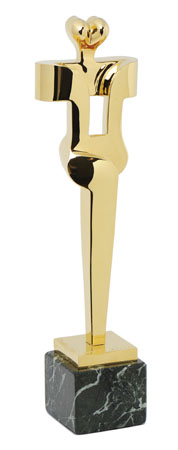Background
First introduced in 1999, the awards were created by several Québec film producers, most prominently Roger Frappier, to protest that the Genie Awards were too English Canadian in their focus. They replaced Les Prix Guy L'Écuyer, created in 1987 by the festival Les Rendez-vous du cinéma québécois in memory of actor Guy L'Écuyer.
The original trophy statue was designed by pioneering Québécois sculptor Charles Daudelin. A new Prix Iris trophy will be unveiled before the ceremony on 4 June 2017.
Administration
The awards are administered by Québec Cinéma, which also oversees the Montréal film festival Rendez-vous du cinéma québécois and the travelling screening series La Tournée du cinéma québécois. Nominations are selected by specially-appointed juries comprising prominent industry members, and individual awards are voted on by members of the trade unions and professional associations that make up the Québec film industry. The ceremonies, which typically take place in February or March, have been broadcast since their inception, and since 2004 by Radio-Canada.
Structure
The awards comprise 18 competitive categories in total — from acting, directing and writing to craft and technical categories — as well as four special prizes: the Billet d’or (Golden Ticket), the equivalent of the Golden Reel Award, goes to the film with the year's highest box-office gross in Québec; Film s'étant le plus illustré à l'extérieur du Québec is awarded to the movie that achieved the greatest international success at festivals and/or during its commercial release; Meilleur exploitant goes to the exhibitor who did the most to promote Québec movies; and the Prix Hommage is presented for lifetime achievement in the Québec film industry.
Prix Hommage Winners
1999 — Marcel Sabourin
2000 — Frédéric Back
2001 — Gilles Carle
2002 — Anne Claire Poirier
2003 — Rock Demers
2004 — Richard Grégoire
2005 — Michel Brault
2006 — Denise Filiatrault
2007 — Pierre Curzi
2008 — Jean-Claude Labrecque
2009 — Fernand Dansereau
2010— René Malo
2011 — Jean Lapointe
2012 — Paule Baillargeon
2013 — Michel Côté
2014 — Micheline Lanctôt
2015 — André Melançon
2016 — François Dompierre
Best Picture Winners
The winners for Best Picture are listed below, along with the producer(s) of each film.
1999 — Le Violon rouge (The Red Violin) (Niv Fichman)
2000 — Post Mortem (Lorraine Dufour)
2001 — Maelström(Roger Frappier, Luc Vandal)
2002 — Un crabe dans la tête (Soft Shell Man) (Luc Déry, Joseph Hillel)
2003 — Québec-Montréal (Nicole Robert)
2004 — Les Invasions barbares (The Barbarian Invasions) (Denise Robert, Daniel Louis)
2005 — Mémoires affectives (Looking for Alexander) (Barbara Shrier)
2006 — C.R.A.Z.Y. (Pierre Even, Jean-Marc Vallée)
2007 — Congorama (Luc Déry and Kim McGraw)
2008 — Continental, un film sans fusil (Continental, a Film Without Guns) (Luc Déry, Kim McCraw)
2009 — Ce qu'il faut pour vivre (The Necessities of Life) (Bernadette Payeur, René Chenier)
2010— J'ai tué ma mère (I Killed My Mother) (Carole Mandello, Daniel Morin)
2011 — Incendies (Luc Déry, Kim McCraw)
2012 — Monsieur Lazhar (Luc Déry, Kim McCraw)
2013 — Rebelle (War Witch) (Pierre Even, Marie-Claude Poulin)
2014 — Louis Cyr:l'homme le plus fort du monde (Louis Cyr) (Christian Larouche, Caroline Héroux, Stéphanie Héroux)
2015 — Mommy (Xavier Dolan, Nancy Grant)
2016 — La Passion d'Augustine (Lyse Lafontaine, François Tremblay)
See also: The Cinema of Québec.

 Share on Facebook
Share on Facebook Share on X
Share on X Share by Email
Share by Email Share on Google Classroom
Share on Google Classroom


